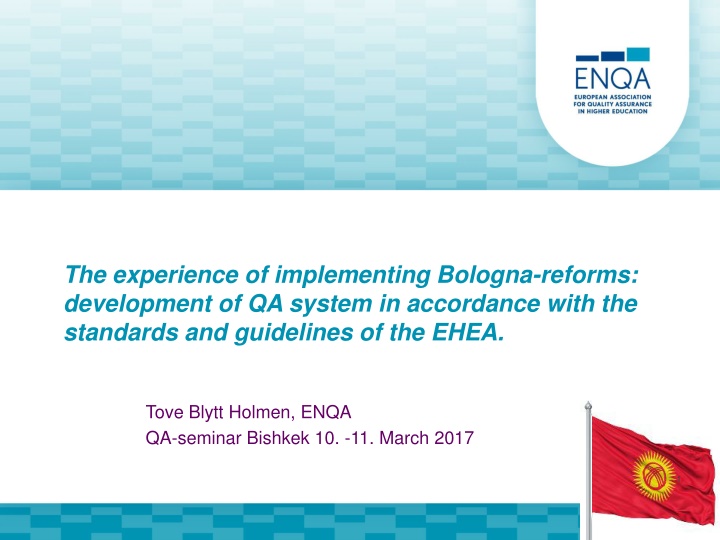
Implementing Bologna Reforms and ENQA Membership Overview
Explore the implementation of Bologna reforms focusing on the development of Quality Assurance systems in alignment with EHEA standards. Understand ENQA as a key membership organization for external QA agencies, promoting good practices and policy expertise in European higher education. Learn about the European Standards and Guidelines guiding QA principles and fostering quality provision in learning environments.
Download Presentation

Please find below an Image/Link to download the presentation.
The content on the website is provided AS IS for your information and personal use only. It may not be sold, licensed, or shared on other websites without obtaining consent from the author. If you encounter any issues during the download, it is possible that the publisher has removed the file from their server.
You are allowed to download the files provided on this website for personal or commercial use, subject to the condition that they are used lawfully. All files are the property of their respective owners.
The content on the website is provided AS IS for your information and personal use only. It may not be sold, licensed, or shared on other websites without obtaining consent from the author.
E N D
Presentation Transcript
The experience of implementing Bologna-reforms: development of QA system in accordance with the standards and guidelines of the EHEA. Tove Blytt Holmen, ENQA QA-seminar Bishkek 10. -11. March 2017 1
Bologna-reform, some elements: Degree structure, 3 + 2 + 3, Bachelor + Master + Ph.D. (1999) Quality Assurance Systematizing internal QA + external QA, Quality Assurance Agencies ESG (2005 and 2015) The European Higher Education Area , EHEA (2010) European Qualification Framework and Learning Outcome Descriptors (Norwegian QF 2013) ECTS (users handbook) (2015) Growing focus on Internationalization and Joint Programmes (2015) Steady progress in almost Tove Blytt Holmen, QA-seminar Bishkek 10.-11. March 2017 | 2
What is ENQA? ENQA is a membership organisation of external Quality Assurance Agencies sharing of good practice and experiences, building QA policy and expertise Represents members in European level policy making; supports members nationally; facilitates networking and sharing of good practice, joint projects, and reflections on QA; coordinates external reviews of QA agencies The criteria for membership is that an agency undergoes a successful external review against the 2015 European Standards and Guidelines (ESG) every five years Tove Blytt Holmen, QA-seminar Bishkek 10.-11. March 2017 3
ENQA member agencies, 49 in 27 countries Tove Blytt Holmen, QA-seminar Bishkek 10.-11. March 2017 4
ENQA affiliates 53 in further 16 countries Tove Blytt Holmen, QA-seminar Bishkek 10.-11. March 2017 5
European Standards and Guidelines Prepared by stakeholders and signed by ministers The ESG provide guidance, covering the areas which are vital for successful quality provision and learning environments in higher education. The ESG are not standards for quality itself. The standards are generic; they allow for diversity within a common framework Focus on quality assurance of learning and teaching, now also with links to research and to the learning environment List the main principles of QA in Europe Tove Blytt Holmen, QA-seminar Bishkek 10.-11. March 2017 6
Main principles for QA in Europe HEIs have primary responsibility for the quality of their provision and its assurance EQA shall respond to the diversity of higher education systems, institutions, programmes and students QA supports the development of a quality culture QA takes into account the needs and expectations of students, all other stakeholders and society strong importance for stakeholder involvement! ___ QA should combine the purposes of accountability and enhancement Safeguard the independence of QA agencies Tove Blytt Holmen, QA-seminar Bishkek 10.-11. March 2017 7
Purposes of the ESG 2015 Set a common framework for quality assurance systems for learning and teaching at European, national and institutional level Enable the assurance and improvement of quality of higher education in the European higher education area Provide information on quality assurance in the EHEA Support mutual trust, thus facilitating recognition and mobility within and across national borders Tove Blytt Holmen, QA-seminar Bishkek 10.-11. March 2017 8
The Minister HEIs Bologna, EHEA The QA Agency Tove Blytt Holmen, QA-seminar Bishkek 10.-11. March 2017 9
ESG: The three parts Part I Part II Part III - Internal QA and operation of the Agency itself - Internal QA within the institution - External QA by the Agency Covers the entire QA cycle at all levels Tove Blytt Holmen, QA-seminar Bishkek 10.-11. March 2017 10
Part 1: Institutions internal quality assurance 1.1 Policy for quality assurance 1.2 Design and approval of programmes 1.3 Student-centered learning, teaching and assessment 1.4 Student admission, progression, recognition and certification 1.5 Teaching staff 1.6 Learning resources and support 1.7 Information management 1.8 Public information (2.6 on reporting) 1.9 On-going monitoring and periodic review of programmes 1.10 Cyclical external quality assurance Tove Blytt Holmen, QA-seminar Bishkek 10.-11. March 2017 11
Part 1: Institutions internal quality assurance 1.1 Policy for quality assurance 1.2 Design and approval of programmes 1.3 Student-centered learning, teaching and assessment 1.4 Student admission, progression, recognition and certification 1.5 Teaching staff 1.6 Learning resources and support 1.7 Information management 1.8 Public information (2.6 on reporting) 1.9 On-going monitoring and periodic review of programmes 1.10 Cyclical external quality assurance Tove Blytt Holmen, QA-seminar Bishkek 10.-11. March 2017 12
Trends in European QA Possible move to softer approaches (fitness-for-purpose), especially in well-established QA systems: from programme to institutional approaches; risk-based methods; more flexible methods or methods based more on institutional priorities Going beyond minimum standards and find ways to measure and reward excellence Greater importance given to the usefulness and readability of reports (competing with international or national rankings as information source?) External accountability of agencies is widely accepted and expected (ENQA/EQAR) Wider involvement of stakeholders accepted and required By far most EHEA countries have now an independent QA agency, compared to a minority 10 years ago Tove Blytt Holmen, QA-seminar Bishkek 10.-11. March 2017 13
Some challenges in European QA Adapting to the requirements in ESG 2015: good practice in many agencies for several years BUT for some agencies big changes are still ahead student involvement publication of reports collaborative relationship with HEIs QA of alternative delivery modes (elearning), etc. Internationalisation of QA agencies use of international reviewers international collaborative projects joint reviews or cross-border reviews Tove Blytt Holmen, QA-seminar Bishkek 10.-11. March 2017 14
Remember: ESG 2015 is about quality assurance Quality has no universal definition Quality is contextual and subjective Learn ESG 2015 and your institution s quality policy by heart Teachers + students + administration: Togetherness makes a difference Tove Blytt Holmen, QA-seminar Bishkek 10.-11. March 2017 | 15
Thank you! www.enqa.eu tove.blytt.holmen@nokut.no


